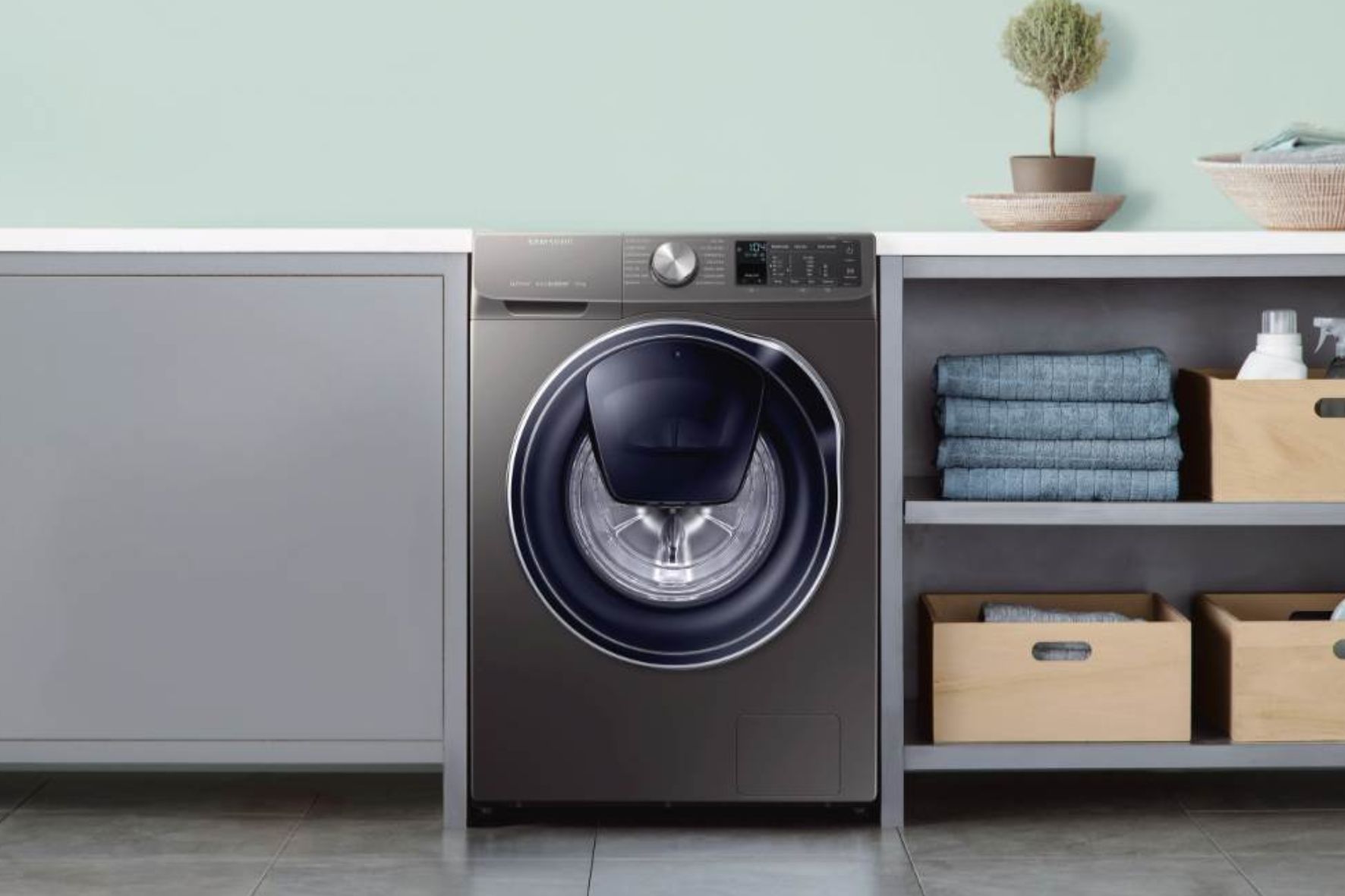
Silence the Rumble: 5 Urgent Fixes for Samsung Washing Machine Noises
Discover 5 urgent fixes for your Samsung washing machine noises with ‘Silence the Rumble’. Learn practical solutions to quiet your appliance and improve your laundry experience.
Samsung Washing Machine auto-balance function may be temporarily unavailable due to grinding noises in your washing machine. In that case, it’s usually a clear indication and leads to further damage, possibly resulting in costly repairs or even the need for a full replacement. These noises are often from worn-out drum bearings, a loose or broken drive belt, or an overloaded motor. Addressing the problem promptly is important, as continuing to run the machine in this condition can worsen the damage.
Samsung washing machines are renowned for their durability, efficiency, and innovative features. However, even the most reliable appliances can encounter issues over time. One common problem that can arise is the appearance of strange noises during operation.
These noises can range from a soft sound to a loud grinding sound. Understanding the root cause of these noises is necessary for diagnosing the problem accurately and implementing the appropriate solutions. In this guide, we will delve into the various components of your Samsung washing machine that could be the cause of these noises.
Diagnosing the Grinding Noise in Your Samsung Washing Machine
The first and most important step in addressing any grinding noise is to properly check and know the source of the problem. Samsung washing machines are typically reliable, but as with any mechanical device, certain components can degrade over time. Grinding noises can occur during washing, rinsing, or spinning cycles and are often the result of worn-out parts, misalignment, or obstructions. Let’s take a closer look at some of the common causes:
- Worn-out Drum Bearings: One of the most common causes of grinding noises in a Samsung washing machine is worn drum bearings. Drum bearings allow the drum to rotate smoothly during the spin cycle. Over time, these bearings can wear out due to uninterrupted cycles and it can cause a loud grinding or rumbling noise. This issue is most noticeable during the high-speed spin cycle when it has reached Its spin Max.
- Damaged Drive Belt: The drive belt connects the washing machine’s motor to the drum. If the belt is loose, worn, or broken, it may slip during operation, producing a grinding sound as it struggles to turn the drum. This is more common in older Samsung Washing machine models that have seen heavy use.
- Overloaded or Failing Motor: The motor is the powerhouse of your Samsung washing machine, responsible for turning the drum. If the motor is overloaded or nearing the end of its lifespan, it may struggle to perform, resulting in grinding or buzzing noises as it attempts to turn the drum under strain.
- Foreign Objects or Debris: Sometimes, objects such as coins, buttons, or other small items accidentally left in pockets can become lodged between the drum and the outer tub. These items create grinding or rattling noises as the drum rotates, if not removed, it can cause long-term damage.
Step 1: Diagnose the Problem
Before jumping into any repairs, it’s essential to diagnose the issue. Samsung washing machines are equipped with numerous moving parts, so knowing the source of the grinding sound is crucial.
Solution: Start by turning off and unplugging your washing machine. Manually turn the drum to see if you can replicate the grinding noise. If the drum feels stiff or you hear grinding even when it’s off, the issue is likely mechanical, such as worn bearings or a faulty belt. If the drum spins freely but the noise persists during operation, the motor may be the culprit.
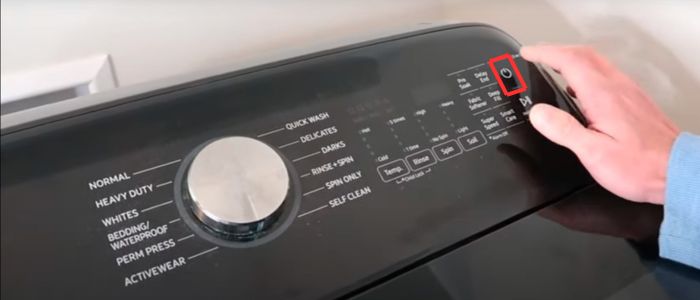
Step 2: Inspect and Replace Drum Bearings
One of the most common causes of grinding noise is worn drum bearings. Samsung washing machines rely on these bearings to rotate the drum smoothly. Over time, as they wear out, they can create loud grinding or rumbling noises. Replacing drum bearings can be a complex task, but it is necessary to prevent further damage to your machine.
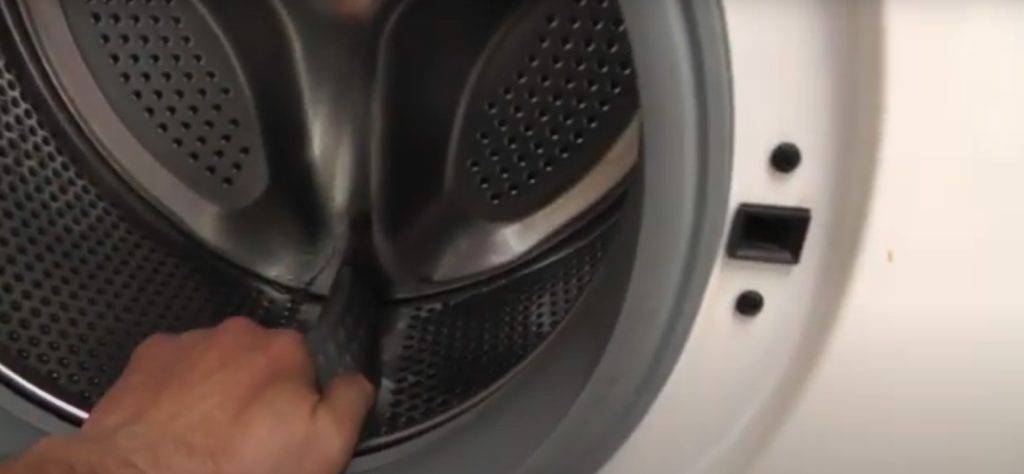
Solution:
- Unplug your Samsung washing machine and remove the back panel to access the drum and bearings.
- Inspect the drum for excessive movement or play. If you can feel or hear grinding while manually turning the drum, the bearings likely need to be replaced.
- This repair typically requires specialized tools and experience, so if you’re unfamiliar with appliance repair, it’s best to call a professional. The bearings are located behind the drum, and replacing them involves dismantling a large portion of the machine.
Step 3: Check and Adjust the Drive Belt
Another potential source of grinding noise in your Samsung Washing Machine is a damaged or loose drive belt. The drive belt transfers power from the motor to the drum, enabling it to spin. Over time, the belt can wear out, become misaligned, or snap, causing grinding or squealing noises as it slips.
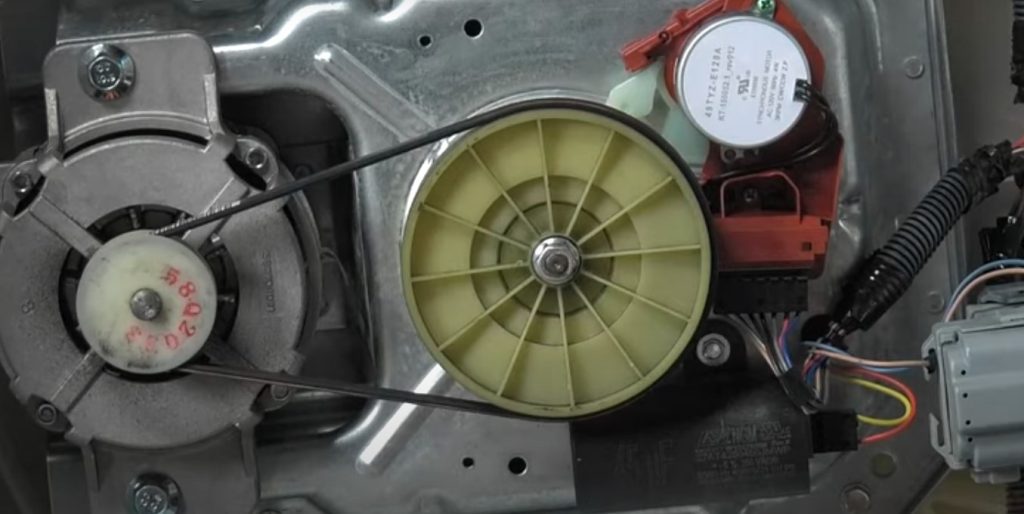
Solution:
- Open the back panel of your washing machine and inspect the drive belt for signs of wear, cracks, or looseness.
- If the belt is damaged, replace it with a new one. Ensure the new belt is aligned correctly and snug.
- If the belt is intact but loose, you can often fix the problem by tightening the tensioner or adjusting the alignment.
Replacing a drive belt is a relatively straightforward task that can be completed with basic tools; however, ensuring the belt is correctly tensioned is essential for preventing future issues.
Step 4: Look for Foreign Objects in the Drum
A common and easily overlooked cause of grinding noises in Samsung washing machines is foreign objects in the Washing Machine like coins, buttons, tissue papers, or small pieces of fabric. These objects can be seen between the drum and the outer tub, creating friction and noise as the drum rotates.
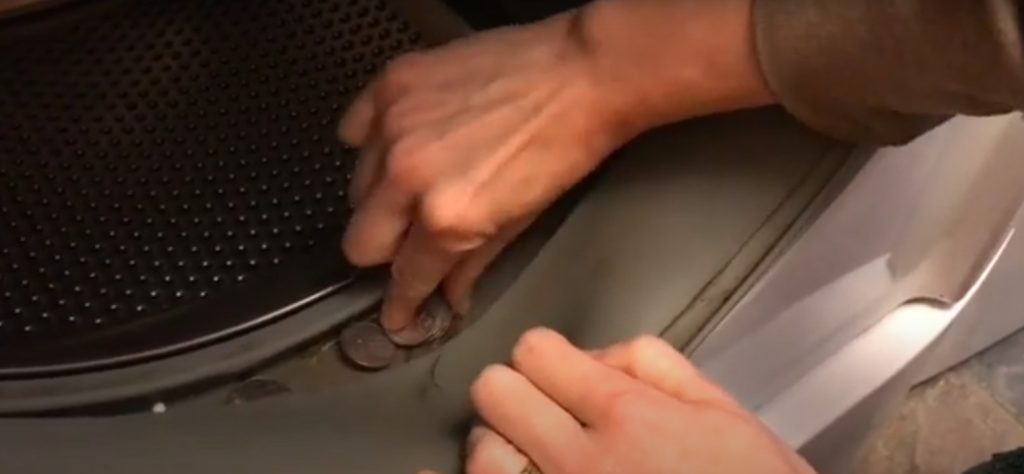
Solution:
- Begin by emptying the drum and carefully inspecting the inside for any objects that may have slipped through the holes.
- If you find any foreign objects, remove them immediately. Don’t forget to check the filter and the drain pump, as these parts can also trap objects that may cause noise.
- To prevent this issue in the future, always check your pockets and remove any small items before washing your clothes.
Step 5: Examine the Motor
If none of the above steps resolve the grinding noise in your Samsung washing machine, the problem may lie with the motor. A motor that is overloaded or on the verge of failure can produce grinding noise as it struggles to turn the drum.
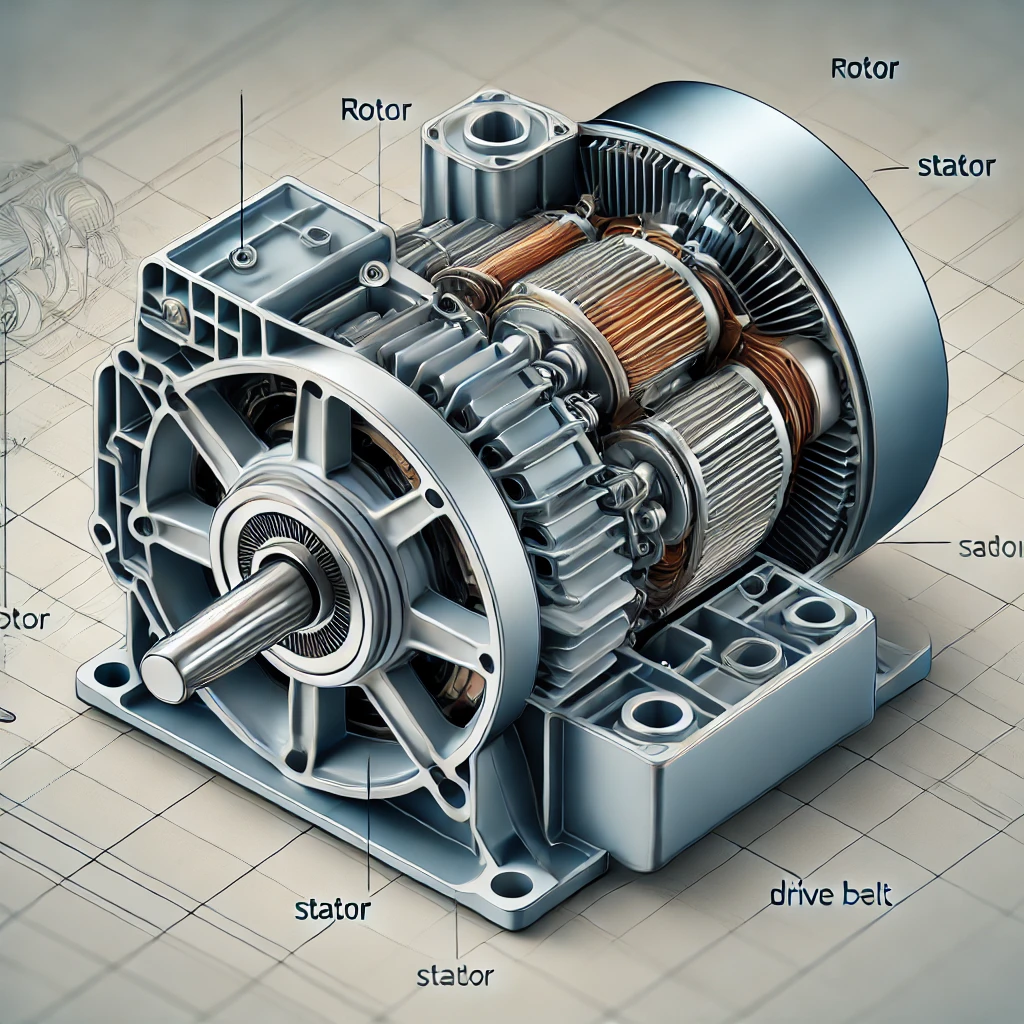
Solution:
- Test the machine with a light load to determine whether the noise is coming from the motor. If the grinding sound persists, the motor may be at fault.
- Motor repairs or replacements are complex and can be costly, so weigh your options carefully. In many cases, it’s best to consult a professional technician if you suspect a motor issue.
Preventive Measures for Your Samsung Washing Machine
Prevention is always better than repair. By following these simple maintenance tips, you can keep your Samsung washing machine running smoothly and avoid future grinding noises:
- Don’t Overload the Machine: Overloading your washing machine puts excess strain on the motor, belt, and drum bearings. Follow the manufacturer’s recommended load size to avoid premature wear.
- Regular Maintenance: Clean the drum, filters, and detergent dispenser regularly to prevent dirt and debris buildup. Check the drum for foreign objects and ensure that the machine is balanced to avoid unnecessary strain on the components.
- Use the Right Detergent: Using the correct type and amount of detergent can prevent excessive suds from building up in the drum, which can cause unnecessary wear and tear on the machine’s internal components.
Check out our detailed guide on Samsung washing machine issues to find expert solutions and keep your Samsung Washing machine running like new.
Conclusion
Addressing grinding noises in your Samsung washing machine is critical to maintaining its performance and extending its lifespan. Following these five essential steps diagnosing the problem, inspecting the drum bearings, checking the drive belt, removing foreign objects, and examining the motor, you can quickly resolve any grinding noise issues. Regular maintenance, such as avoiding overloading and using the correct detergent, will help you prevent future problems.
Here’s what you need to know:
- Identify the source of the noise: Is it coming from the drum, the motor, or another component?
- Check for common causes: Unbalanced loads, foreign objects, or worn-out bearings are frequent culprits.
- Try simple solutions: Balancing your laundry, removing any foreign objects, or adjusting the machine’s level can often resolve the issue.
- When to seek professional help: If DIY solutions don’t work or the noise is severe, it’s time to consult a technician.
FREQUENTLY ASKED QUESTIONS
1. Why is my Samsung washing machine making grinding noises?
Grinding noises can occur due to various reasons such as a damaged drum bearing, worn-out drive belt, or an object stuck in the drum. Regular maintenance and inspections can help prevent these issues.
2. What are the top 5 fixes for Samsung washing machine grinding noises?
The top 5 urgent fixes include:
- Inspecting and replacing the drum bearings.
- Checking and tightening the drive belt.
- Removing foreign objects from the drum.
- Aligning the washing machine on a flat surface.
- Cleaning and inspecting the pump and filter for clogs.
3. Can I fix Samsung washing machine noises myself, or do I need professional help?
Some minor issues, like removing foreign objects or cleaning the filter, can be handled on your own. However, for complex problems like replacing bearings or the drive motor, it’s best to consult a professional technician.
4. How can I prevent my washing machine from making grinding noises in the future?
To prevent grinding noises, follow these tips:
- Regularly clean the drum and filter.
- Avoid overloading the washing machine.
- Inspect and replace worn-out parts promptly.
- Place the machine on a stable, level surface.
5. Is it safe to use my washing machine if it’s making grinding noises?
No, continuing to use your washing machine with grinding noises can worsen the damage and lead to costly repairs. It’s recommended to address the issue immediately.
